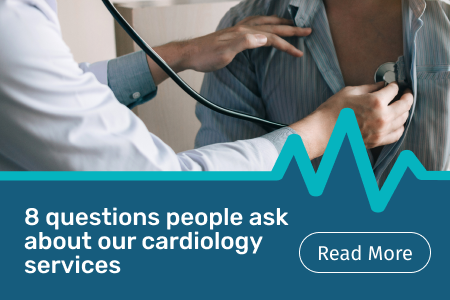
Cardiology Service
Knox Private Hospital has over 30 years of cardiac experience and is one of the leading cardiac hospitals in Melbourne. We perform thousands of diagnostic cardiac tests, procedures and surgeries every year thanks to more than 25 cardiologists treating their patients here.
We provide integrated cardiology care incorporating diagnostic, therapeutic and procedural services in our leading edge catheter labs, hybrid theatre and designated cardiac surgery theatre. Our cardiac services are supported by a 10 bed coronary care, 10 bed intensive care units and dedicated cardiac wards.
Knox Private Hospital has one of the fastest Emergency departments for treating patients experiencing a heart attack. Our quick reaction time can significantly reduce the risk of increased heart damage and we consistently perform in this area to achieve the best possible patient outcomes.
It's safe to say that you, the patient, are at the heart of everything we do.
The private experience
Patients enjoy the privacy of a large single room with ensuite. You’ll love our menu options, enjoying all the nutritious and delicious meals.
Patients have access to dietitian services and a specialist for people with complex medical issues to help assess suitability for surgery.
Next steps
If your GP has recommended more complex cardiac care, ask for a referral to one of the state’s leading specialists.
Tell them that you prefer to be treated at Knox Private Hospital, the heart of cardiac care.
Our world class cardiologists and cardiothoracic surgeons treat a range of heart conditions and related symptoms.
If you are experiencing any of the symptoms listed below:
- Chest pain/angina
- Palpitations- racing or irregular heartbeat.
- Shortness of breath
- Dizziness or fainting
- Signs of heart failure – swollen ankles, unable to lie flat or waking short of breath
Contact your GP or present to our emergency department for assessment. If you require urgent attention dial 000 (triple zero) and ask for an Ambulance.
Diagnostic cardiology - testing your heart health
Knox Heart Centre – Cardiac Diagnostic Services
In addition to private consultation, elective or emergency interventional / procedural and surgical cardiac services, Knox Private Hospital also offers an in-house cardiac testing service - Knox Heart Centre staffed by a highly trained and experience cardiac diagnostic team.
We offer appointments with minimal wait times for the following:
- Transthoracic Echo
- Holter monitoring
- Stress Echo
Tests are conducted using the latest, state of the art cardiac diagnostic equipment by highly experienced sonographers and cardiac technicians. A Cardiologist reviews your results and sends a written report to your referring doctor. In the case of a significant finding, we will contact your referring doctor immediately to establish a plan of evaluation by a Cardiologist and organize a hospital admission for further assessment and management if required.
All our tests are bulk billed for pensioners and green healthcare card holders if referred by your GP or specialist.
We prioritise all urgent referrals and can accommodate patients at short notice when required by your referring doctor.
The Knox Heart Centre – Cardiac Diagnostic Services is located on level 1 of Knox Private Hospital.
Please report to front reception upon arrival to the hospital and our friendly staff will assist you with directions to Level 1.
We accept referrals from surrounding General Practitioners and other specialists.
Our service runs Monday to Friday between 8.00am to 5.00pm.
Ample undercover parking across 2 basement levels is available at commercial rates (entry only from Boronia Road). The carpark provides direct access to the hospital via lifts.
Bus: Route 901, 738 and 745. For full timetable and route information visit www.ptv.vic.gov.au
By Train: Belgrave and Lilydale lines. The Hospital is accessible by transferring to a SmartBus at Ringwood Station. Route 901 bus services connect Ringwood Station bus interchange (on the north side of the station) to Knox Private Hospital and run every 15 minutes. Bus connections can also be made via Mitcham or Bayswater Station, noting that the connecting bus services (Routes 738 from Mitcham or Route 745 from Bayswater) are less frequent.
Download an electronic version of the referral form here
Knox Heart Centre - Cardiac Diagnostic Services
Level 1, Knox Private Hospital
262 Mountain Hwy WANTIRNA
T 03 9210 7060
F 03 9210 7064
E knoxheartcentre@healthscope.com.au
Procedures we offer
Coronary bypass surgery, otherwise known as coronary artery bypass graft (CABG or CAGs) surgery is a procedure that uses another artery or vein to restore blood flow to your heart muscle by bypassing the area of blockage or narrowing.
- Cardiac valve repair & replacement
- Reconstruction/ replacement of the thoracic aorta, including the arch
- Radio frequency ablation for life-threatening arrhythmias
- Correction of congenital cardiac abnormalities in adults
For severely narrowed or leaking valves these may be repaired or replaced. This can be achieved with standard surgery, less invasive surgery or via minimally invasive catheter-based procedures. To replace a heart valve, your doctor may remove the heart valve and replace it with a mechanical valve or a biological tissue valve.
Coronary angiography is the process of taking images of thecoronary “heart” arteries by passing a thin tube called a catheter through anarm and leg artery to the top of the heart. A small amount of contrast isinjected and an x-ray camera outside the body takes images.
Coronary angioplasty and stenting are procedures to reopenblocked or significantly narrowed coronary arteries. This may involve inflatinga balloon or placing a stent (an expandable metal scaffold) into the artery torestore blood flow.
Angiography and stenting are commonly performed under localanaesthetic and IV sedation without the need for a general anaesthetic.
CTCA uses computed tomography (CT) scanning to take detailed images of the heart. It is a quick (scanning takes 15 seconds) and easy test, without the need for invasive procedures, to determine if there are any significant narrowing in the heart arteries.
Cardiac rehabilitation programs are offered nearby at The Victorian Rehabilitation Centre.
Programs are designed to educate, recondition and improve functional confidence with increased endurance for patients following cardiac event or surgery.
The cardiac rehabilitation team, comprising of Rehabilitation Physicians, specialised nursing staff and allied health professionals, develop a tailored cardiac management plan specific to your needs.
The goals of cardiac rehabilitation include:
- Maximising physical, psychological, and social recovery
- Minimising the progression of coronary artery disease
- Reducing risk factors and adopting a healthier lifestyle
- Successful return to work, home and recreational activities
DC cardioversion (DCCV) is used to treat irregular heart rhythms - commonly atrial fibrillation. The procedure involves a general anaesthetic and placement of electrodes on the chest. An electrical impulse or shock is delivered to return the heart rhythm to normal.
Electrophysiology (EP) studies, are a series of tests that examine your heart's electrical activity. They involve mapping the electrical paths in the heart to determine if significant electrical abnormalities exist. This may be carried out prior to considering the best management for heart arrhythmias.
Cardiac ablation uses heat (radiofrequency) or cold (cryo) energy to create tiny scars in your heart to block abnormal electrical signals that cause rhythm disturbances. This procedure is used to correct heart rhythm problems such as atrial fibrillation.
An implantable loop recorder is a convenient and easy way to obtain long term ECG recording by implanting a tiny paperclip sized device under the skin. This device can record ECGs for 3 plus years and is generally suited for patients with unexplained fainting and strokes/ mini strokes of unknown cause. Your doctor can remotely monitor your heart rhythm via a mobile link that you keep in your home.
A pacemaker is a small device usually inserted under the skin of the upper chest and attached to a pacing wire that paces your heart when your heart is unable to do so adequately. This procedure is commonly performed under local anaesthetic without the need for a general anaesthetic.
Structural heart procedures provided by Knox Private Hospital include:
- Patent foramen ovale closure (PFO)
- Atrial septal defect (ASD)
- Left Atrial Appendage Occlusion or Closure
- TAVI (Transcatheter Aortic Valve Implantation)
Transcatheter aortic valve implantation (TAVI) is a minimally invasive heart procedure performed via femoral artery access and avoids the need for a large surgical cut. Your Cardiologist and surgeon will advise if this procedure is suitable for you.
Mitral valve surgery can also be performed minimally invasively by either repairing a leaking valve with a clip or a new valve or by ballooning a narrowed mitral valve.A transesophageal echocardiogram is a type of echocardiogram (heart ultrasound) that takes images from behind the heart. This is achieved by passing the probe down the back of the throat (very similar to an endoscopy or gastroscopy procedure). The images obtained are of better quality than a normal echocardiogram due to the lack of lung (air) between echo probe and heart.



